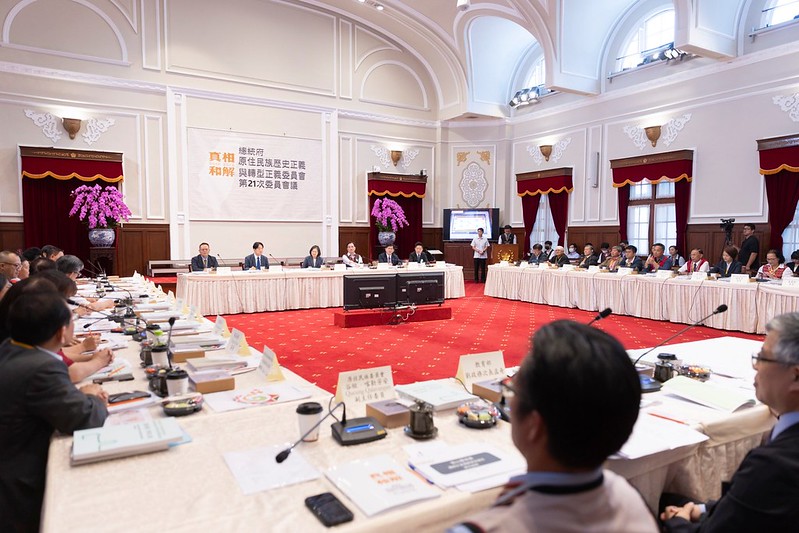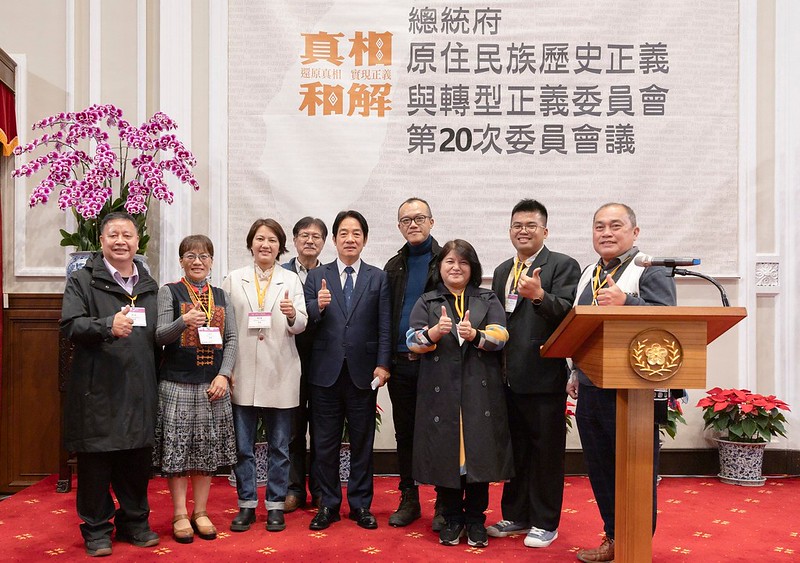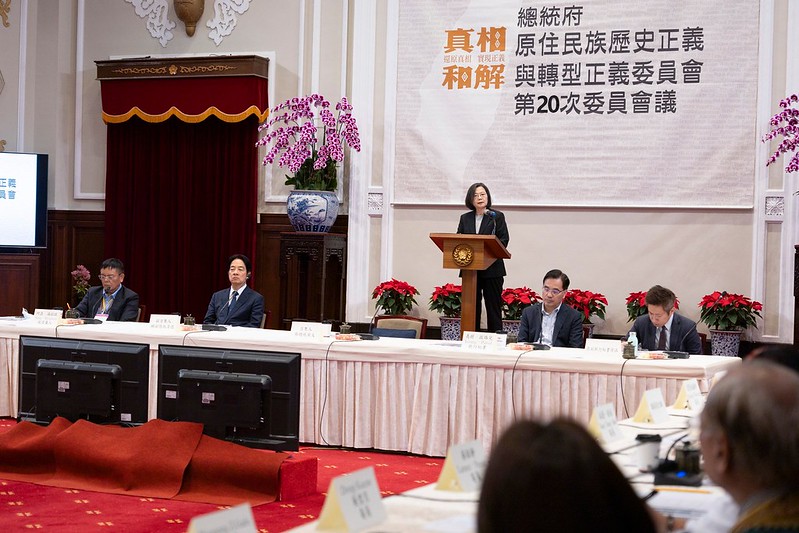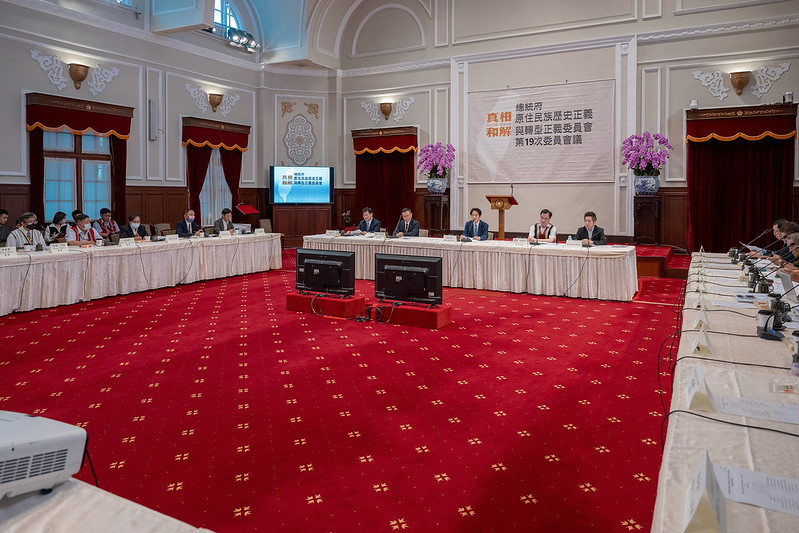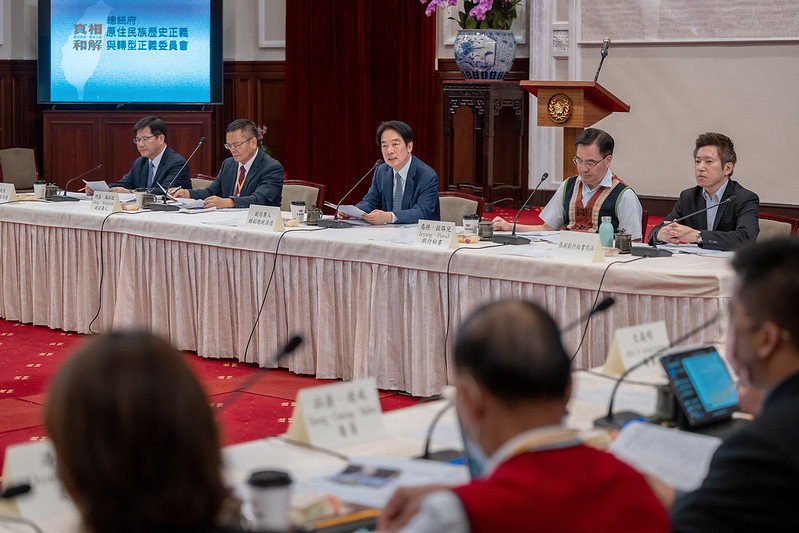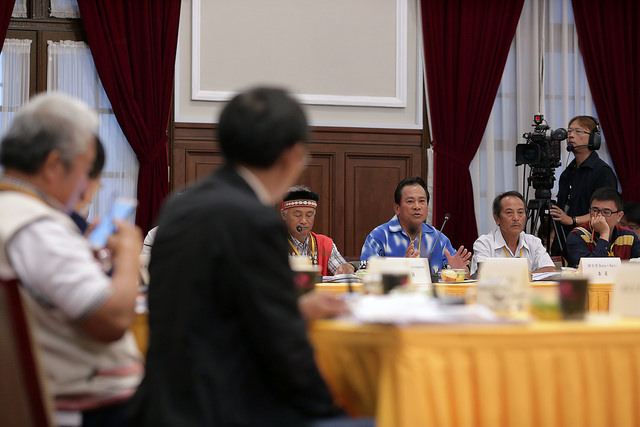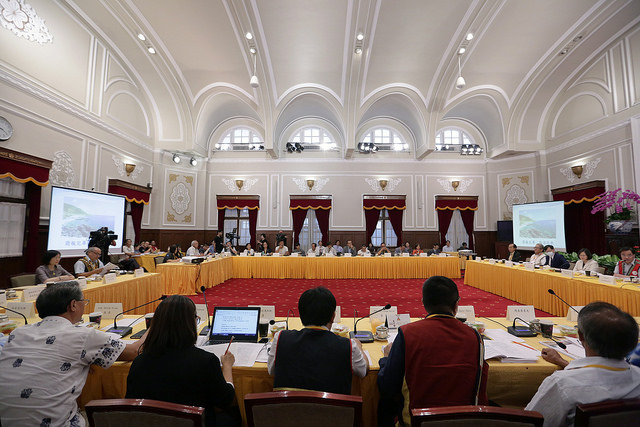News & activities
 News releases
News releases
On the afternoon of June 30, President Tsai Ing-wen presided over a meeting of the Presidential Office Indigenous Historical Justice and Transitional Justice Committee, where she stressed her determination to take a steady and measured approach to fulfilling the commitments she made when she apologized to Taiwan's indigenous peoples. She also expressed hope that the people of Taiwan can tap into their collective wisdom to "clarify historical facts, spur societal communication, and settle upon the future direction of policy" so that Taiwan society can move toward reconciliation among the various ethnic groups.
The following is a translation of President Tsai's remarks:
Today, we are holding the second meeting of the Presidential Office Indigenous Historical Justice and Transitional Justice Committee. I am very happy to see all the committee members again, and to join you in facing up to the truth and seeking reconciliation.
It is true that the committee only meets once every three months, but between meetings, our committee staff keep right on working.
The five thematic subcommittees have completed recruiting members, and their conveners are of the highest caliber. For two of the subcommittees, one for languages and another for culture, we've retained distinguished academics to serve as conveners, Professor Masegeseg Z. Gadu (童春發) and Professor Agilasay Pakawyan (林志興), both of whom are deeply respected by their people.
The convener of the Subcommittee on Land Matters, which deals with matters of great concern to indigenous communities, is Associate Professor Awi Mona (蔡志偉), the first member of an indigenous Taiwan tribe to obtain a doctorate in law.
Associate Professor Su-chen Lin (林素珍), the convener of the Subcommittee on History, is the first member of an indigenous Taiwan tribe to obtain a Ph.D. in the field of history.
In addition, the convener of the Subcommittee on Reconciliation, Associate Professor Jolan Hsieh (謝若蘭), is a member of the Siraya people, a Pingpu ethnic group. She has proposed many initiatives relating to ethnic justice.
The committee brings together an outstanding collection of professional scholars as well as committee members selected by each of Taiwan's ethnic groups. The idea is to tap into our collective wisdom to clarify historical facts, spur societal communication, and settle upon the future direction of policy so that Taiwan society can move toward reconciliation among the various ethnic groups.
In order to achieve these objectives, each of the five thematic subcommittees has prepared a draft work outline, and later today the proposals will be discussed by all of the committee members.
Over the past three months, the government has achieved several important successes in its efforts to promote its indigenous affairs policies.
Late last month the Legislative Yuan passed the Indigenous Languages Development Act, which expressly defines the language of each indigenous group as an official language of Taiwan, and clearly requires government agencies at all levels to preserve and develop indigenous languages.
For a long time, indigenous people were not encouraged to speak their native tongues, and were even forbidden from doing so. Today, the government must work doubly hard to reinstate the right of indigenous peoples to use their own languages. This is a direct expression of historical justice.
The Indigenous Languages Development Act is a piece of subordinate legislation required by the Indigenous Peoples Basic Law, but only recently enacted after 12 long years. This one example shows just how challenging it is to implement the Indigenous Peoples Basic Law.
That is why, when I apologized to the indigenous peoples last August, I pledged that the Executive Yuan would regularly convene the Indigenous Peoples Basic Law Promotion Committee to carefully assess the implementation status of the Indigenous Peoples Basic Law. The Executive Yuan has carried through on this pledge. In just a bit, we will hear a work report from that committee.
I want to stress once again that the issues of indigenous historical justice and transitional justice are not just the concern of indigenous peoples, or of the Council of Indigenous Peoples. The Indigenous Historical Justice and Transitional Justice Committee will only succeed when all government agencies get involved in its work.
We've also invited the Forestry Bureau of our Council of Agriculture to present a report at today's meeting on the subject of "Promotion of Indigenous Historical Justice." We are at a key historical moment. In the past, in managing forests, the government often got into disputes or conflicts with indigenous peoples. Now we can finally engage in public discussion about such matters. This is an opportunity to heal wounds and move to a new phase.
Also, transitional justice must be rooted in truth. We've asked Minister without Portfolio Lin Wan-i (林萬億) to give a progress report on the work of the Executive Yuan Investigative Task Force for Nuclear Waste Storage on Lanyu Island.
I hope that the work of the Executive Yuan and the Forestry Bureau will spur more government agencies to get actively involved in the investigative work of the committee's various subcommittees, and even take the initiative to propose action plans for inter-ethnic dialogue.
The way we've arranged the agenda shows that, thanks to the efforts of all the committee members and staff, the committee is starting to achieve some progress in its work.
Of course, I clearly realize that some long-standing problems cannot necessarily be resolved in a short time. Over these past few months, some indigenous people have taken to the streets to express their wishes to the government.
I want to stress my determination to fulfill the commitments I made when I apologized to the indigenous peoples. But I would add, however, that I will act upon this determination in a very steady and measured fashion.
The pursuit of justice takes a long time. I hope that the committee members can continue encouraging their respective peoples to look upon the committee as a platform for dialogue, so that we can work together on this important historical process. We will not just be marking time; to the contrary, we are going to move steadily forward.
I know that all the committee members have put a lot of effort into soliciting the views of their fellow community members, and have been very forthcoming in sharing their thoughts. Next, let's get started on today's agenda and leave as much time as possible for everyone to say what's on their mind. Thank you.
After concluding her remarks, the president listened to a progress report by Minister without Portfolio Lin Wan-i on the work of the Executive Yuan Investigative Task Force for Nuclear Waste Storage on Lanyu Island. This was followed by a report by Icyang Parod (夷將‧拔路兒), Minister of the Council of Indigenous Peoples, on the work of the Indigenous Peoples Basic Law Promotion Committee under the Executive Yuan, and then a report entitled "Reconciling for Coexistence and Moving Forward toward Sustainable Development" by Forestry Bureau Director General Lin Hwa-ching (林華慶) on the bureau's special project to promote indigenous historical justice. The president also used this time to exchange views with the committee members.
